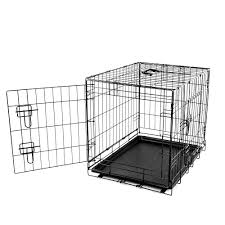The Importance of Dog Cages
Dog cages, also known as crates or kennels, are valuable tools for dog owners in providing a safe and secure environment for their furry friends. While some may view cages as confinement, when used properly, they can offer numerous benefits for both dogs and their owners.
Training and Safety
One of the primary purposes of a dog cage is to assist in training. Dogs are den animals by nature and often seek out small, enclosed spaces for comfort. A cage can serve as a den-like retreat where a dog can feel secure and relaxed. It can also aid in housebreaking by establishing a designated space for the dog to rest and avoid accidents.
Traveling and Transport
When traveling with your dog, a cage provides a familiar environment that can reduce stress and anxiety. It ensures your pet’s safety during car rides and prevents distractions that could lead to accidents. Additionally, many airlines require dogs to be crated during flights for the safety of both the pet and other passengers.
Preventing Destructive Behavior
Dogs may exhibit destructive behavior when left unsupervised, such as chewing furniture or belongings. A cage can prevent these behaviors by restricting the dog’s access to areas where they may cause damage. It also keeps them safe from ingesting harmful objects while you are away.
Creating a Safe Space
For dogs that experience anxiety or fear in certain situations, a cage can provide a sense of security. By having their own space within the home, dogs have a place to retreat when feeling overwhelmed or stressed. This safe haven can help them relax and feel more at ease in challenging situations.
Conclusion
In conclusion, dog cages play an essential role in promoting the well-being of our canine companions. When used appropriately and with care, cages offer comfort, security, and structure for dogs while aiding in training and behavior management. They serve as valuable tools that contribute to a happy and harmonious relationship between dogs and their owners.
7 Benefits of Using Dog Cages for Your Furry Friend’s Well-Being
- Provides a safe and secure environment for the dog
- Aids in housebreaking and crate training
- Reduces stress and anxiety during travel
- Prevents destructive behavior when unsupervised
- Offers a den-like retreat for comfort
- Creates a designated space for the dog to rest
- Promotes safety by restricting access to harmful objects
5 Drawbacks of Using Dog Cages: Understanding the Potential Risks
- Some dogs may feel confined or stressed when placed in a cage for extended periods.
- Improper use of cages can lead to negative associations and behavioral issues in dogs.
- Inadequate sizing or improper setup of a cage can cause discomfort or injury to the dog.
- Over-reliance on cages may hinder socialization and interaction with the family.
- Certain breeds or individual dogs may not respond well to being confined in a cage.
Provides a safe and secure environment for the dog
Dog cages offer a crucial benefit by providing a safe and secure environment for the dog. These enclosed spaces serve as a sanctuary where dogs can feel protected and at ease. By having a designated area that is their own, dogs can retreat to their cage for comfort and security, especially in unfamiliar or potentially stressful situations. This sense of security promotes peace of mind for both the dog and the owner, ensuring that the dog is kept safe from potential hazards while also reducing anxiety and promoting overall well-being.
Aids in housebreaking and crate training
One significant benefit of using dog cages is that they aid in housebreaking and crate training. By providing a designated and secure space for your dog to rest, eat, and sleep, crates help establish a routine and reinforce positive behaviors. Dogs naturally avoid soiling their living spaces, making crates an effective tool in housebreaking by encouraging them to hold their bladder until they are taken outside. Crate training also teaches dogs to see their crate as a safe haven, promoting a sense of security and comfort for your furry companion.
Reduces stress and anxiety during travel
One significant benefit of using dog cages is their ability to reduce stress and anxiety during travel. By providing a familiar and secure environment for dogs, crates offer a sense of comfort and safety that can help alleviate the anxiety often experienced by pets when on the move. The enclosed space of a cage creates a cozy retreat where dogs can feel protected and calm, making journeys more manageable for both the pet and their owner.
Prevents destructive behavior when unsupervised
One significant advantage of using dog cages is their ability to prevent destructive behavior when dogs are left unsupervised. Dogs, especially young or energetic ones, may engage in destructive activities like chewing furniture or belongings when left alone. A well-fitted cage provides a safe and secure space where dogs can stay confined and unable to access items that they may damage. By confining them in a crate during unsupervised periods, owners can effectively manage and minimize the risk of destructive behavior, ensuring the safety of both the dog and the household belongings.
Offers a den-like retreat for comfort
Dog cages provide a den-like retreat for comfort, allowing dogs to have a secure and cozy space that mimics their natural instinct to seek out enclosed areas for relaxation. This feature of dog cages helps create a safe and calming environment where dogs can retreat to feel secure and at ease, promoting their overall well-being and reducing stress and anxiety levels. By offering a den-like retreat, dog cages cater to the innate needs of dogs and provide them with a comforting space they can call their own within the home.
Creates a designated space for the dog to rest
One of the significant advantages of using a dog cage is that it creates a designated space for the dog to rest. Dogs, being den animals by nature, often seek out small, enclosed spaces for comfort and security. Having a dedicated area within a cage allows the dog to have their own peaceful retreat where they can relax, unwind, and feel safe. This designated resting space not only promotes better sleep and relaxation for the dog but also helps establish a sense of routine and structure in their daily lives.
Promotes safety by restricting access to harmful objects
Dog cages promote safety by restricting access to harmful objects, providing a secure environment where dogs can stay protected from ingesting potentially dangerous items. By confining them in a cage when unsupervised, pet owners can prevent accidents and injuries caused by chewing on toxic substances or swallowing small objects. This proactive measure ensures the well-being of the dog and gives owners peace of mind knowing their furry companions are safe from harm.
Some dogs may feel confined or stressed when placed in a cage for extended periods.
Some dogs may experience feelings of confinement and stress when placed in a cage for extended periods of time. While cages can provide a sense of security for many dogs, others may feel anxious or restricted by the enclosed space. It is important for dog owners to be mindful of their pet’s individual needs and preferences when using a cage, ensuring that it is not causing undue distress or discomfort. Proper training, gradual acclimation, and providing ample opportunities for exercise and social interaction outside of the cage can help mitigate these negative effects and promote a positive relationship between dogs and their living environment.
Improper use of cages can lead to negative associations and behavioral issues in dogs.
Improper use of dog cages can have detrimental effects on a dog’s mental well-being. When cages are used inappropriately, such as for extended periods without breaks or as a form of punishment, dogs may develop negative associations with them. This can lead to increased stress, anxiety, and even behavioral issues such as aggression or fearfulness. It is crucial for dog owners to understand the proper ways to introduce and utilize cages to ensure that they serve as a safe and comforting space for their pets rather than contributing to negative emotions and behaviors.
Inadequate sizing or improper setup of a cage can cause discomfort or injury to the dog.
Inadequate sizing or improper setup of a dog cage can lead to discomfort or injury for the dog. A cage that is too small restricts the dog’s movement and may cause physical discomfort, leading to stress and anxiety. Additionally, if the cage is not set up properly with appropriate bedding and water, it can result in injuries such as abrasions or cuts. It is crucial for dog owners to ensure that the cage is spacious enough for the dog to stand, turn around, and lie down comfortably, and that it is equipped with necessary amenities to promote the well-being of their furry friend.
Over-reliance on cages may hinder socialization and interaction with the family.
An over-reliance on dog cages can potentially hinder a dog’s socialization and interaction with the family. When a dog spends extended periods confined to a cage, it may miss out on valuable opportunities to engage with family members and develop social skills. Dogs thrive on companionship and interaction, and excessive time in a cage could lead to feelings of isolation and detachment from the family unit. It is important for dog owners to strike a balance between using cages for necessary purposes like training or safety and ensuring that their furry companions have ample opportunities for socialization and bonding with their human family members.
Certain breeds or individual dogs may not respond well to being confined in a cage.
Certain breeds or individual dogs may not respond well to being confined in a cage. Some dogs, especially those with high energy levels or strong separation anxiety, may find the restriction of a cage distressing or even exacerbate their behavioral issues. For these dogs, being confined in a cage can lead to increased stress, agitation, and potential attempts to escape. It is important for dog owners to recognize and respect their pet’s individual needs and preferences when considering the use of a cage, as forcing a dog into confinement that causes them distress can have negative effects on their well-being and behavior.




